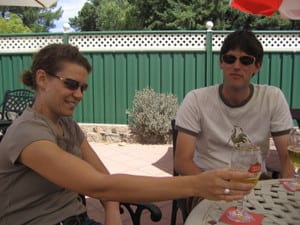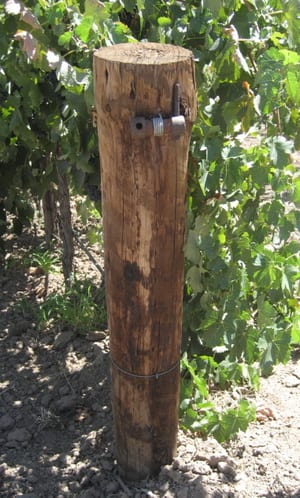 The landlocked Barossa Valley is a deeply rooted agricultural region still strongly, and strangely, influenced by their German and English heritage. It’s been odd speaking German with the locals here and eating phenomenal bratwurst, but in many ways it’s refreshing to see an area remain so true to its past.
The landlocked Barossa Valley is a deeply rooted agricultural region still strongly, and strangely, influenced by their German and English heritage. It’s been odd speaking German with the locals here and eating phenomenal bratwurst, but in many ways it’s refreshing to see an area remain so true to its past. 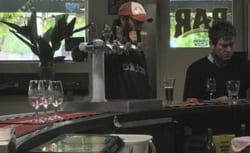
Compared to the fresh and breezy coastal McLaren Vale to the South, the Barossa feels much older and cloistered, which sometimes gives me an eerie feeling at night. It seems entirely possible that witchcraft could easily become popular here, off in the hills, under a massive gum tree. In fact, there was a family of 6 named Herbig who actually lived inside a hollowed out, ancient gum. 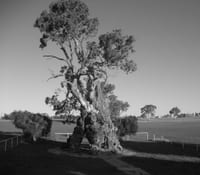
The villages round the Barossa are tiny and close knit and not easy for outsiders to enter. You get the feeling everybody knows everybody very well within 50 kilometers. But like any proud gang, once you belong, they take care of you. Although I have been warmly received due to my friends who live here, God be with those that betray them. In some cases the woman have bigger balls than the men, and they let you know it, too. Twice in one night, two different woman told me that they would quickly disembowel me if I crossed them, but as long as I showed respect, I was “golden“. Honestly, I was completely minding my own business.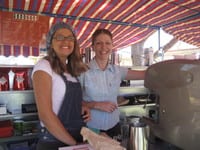
The village pub, or “hotel”, is the social center, with publicans making neighborhood announcements after weekly raffle drawings. Children, milling around inside the pub spontaneously creating gymnastic-like moves and crawling under the bar stools, are as integral to the hotel’s communal fabric as their drinking parents. Who needs babysitters when the whole family is in the pub? 
The patrons are often related to each other somewhere down the line and watch each other’s backs closely. A new family can feel alienated here, which explains why an area so rich in land has almost no foreign interests farming here. They protect themselves from the outsiders coming in to compete; their livelihoods depend on it. Some folks I spoke with say it took them 10 years before they felt truly at home after moving here from Brisbane. This doesn’t mean the natives are cold, they just watch over their own, like any closely connected community. 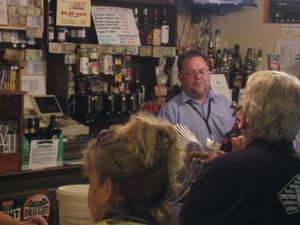
But if tragedy does befall a newby, rest assured they will gather around and do anything and everything to help them through their tough time. Mark and Kathy, the publicans of the Eden Valley Hotel, moved here recently from Adelaide and were treated with suspicion(partially because he supports the Port Adelaide footie team). But all that was quickly forgotten when they lost a son in a car crash on one of the dangerous roads here. The community came out in throngs to make sure he, his family, and their business were taken care of. The vibe in his pub now is like sitting in your family room at home.
Later in the night, so I hear, dancing and singing at the Eden Valley Hotel is not unusual. “The Band Played Waltzing Matilda” by the Pogues, a ballad about the battle at Gallipoli, can be heard over and over and over, with most of us thinking we actually sing it better than Shane MacGowan. Doubtful.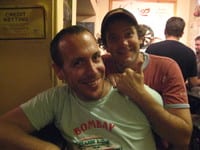
All of this community and history means that the grape growing families here know what they’re doing and what’s going on around them. Members of old time Barossa families are often called “Boxheads” behind their backs, which refers to their stubborn nature and deep rooted ways of living in one place. They know their vineyards and their neighbor’s vineyard practices inside and out. There are many fourth generation families of farmers and a handful of fifth generation. It’s a real mark of distinction to be part of the fifth generation and, like Sicily, they are revered families and given heavy respect. Not so much from the fear of violence, although that might certainly be possible, as much as for just plain endurance, commitment, and the wealth of knowledge passed down from father to son. This generational continuity is invaluable exactly when it comes to things like farming, the bread and butter of this community, be it marijuana or grapes. Both crops, especially grapes, demand deep experience and broad knowledge of the land and its many adversaries. 
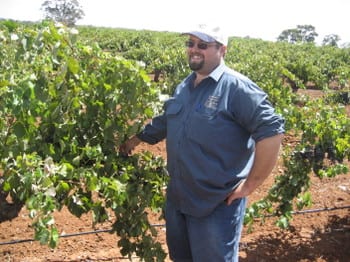 Five generations doesn’t sound so impressive compared with China or Europe perhaps, but in a relatively young country in regards to Western immigration like Australia, and especially in a farming community, it means everything. As I’ve made my rounds in the Barossa, there has been one man in particular that gets such respect: viticulturist Adrian Hoffmann. One of “the FIVES”, as I call fifth generation boxheads, Adrian, 32 with kids and sunday school street cred, is a walking geology and history lesson, and a real nice guy. Much like Oregon’s Ken Wright or Austria’s Willi Brundlmayer, walking through the vineyards with Adrian, who is the liason between the Barossa growers and R wines, is like talking to the man who knew too much. Off handed comments about vineyard x’s unusual water access accounting for their high yields in a drought year or how to slaughter a lamb in a thunder storm make for a hell of an afternoon. His family happens to also own vineyards, obviously, and one of the oldest and dearest vineyards in the Valley at that, fetching upwards to 7000$ a ton for fruit from their immaculate 70+ year old vine shiraz.
Five generations doesn’t sound so impressive compared with China or Europe perhaps, but in a relatively young country in regards to Western immigration like Australia, and especially in a farming community, it means everything. As I’ve made my rounds in the Barossa, there has been one man in particular that gets such respect: viticulturist Adrian Hoffmann. One of “the FIVES”, as I call fifth generation boxheads, Adrian, 32 with kids and sunday school street cred, is a walking geology and history lesson, and a real nice guy. Much like Oregon’s Ken Wright or Austria’s Willi Brundlmayer, walking through the vineyards with Adrian, who is the liason between the Barossa growers and R wines, is like talking to the man who knew too much. Off handed comments about vineyard x’s unusual water access accounting for their high yields in a drought year or how to slaughter a lamb in a thunder storm make for a hell of an afternoon. His family happens to also own vineyards, obviously, and one of the oldest and dearest vineyards in the Valley at that, fetching upwards to 7000$ a ton for fruit from their immaculate 70+ year old vine shiraz.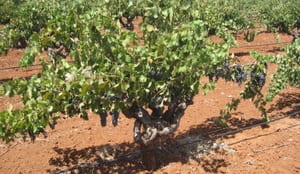
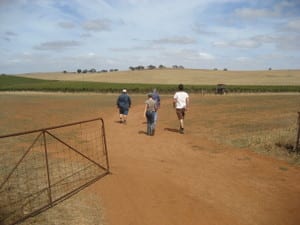
Adrian, myself, and the R winemakers walked through dozens of vineyards this dusty, sunny Saturday gauging ripeness of grenache, shiraz, mataro, and the odd white frontagnac. It’s partly scientific for me, and very humbling, because without exception, every vineyard we entered the grower managed to find us. Our group was slightly irritated by their presence since they were there specifically to ask when are we going to green light their harvest. Grapes are starting to bag nicely (shrivel), but in some cases are still a week away from their perfect ripeness since all in all bunches look uneven (see picture). Growers know many things, but one thing in particular, as i saw last week in McLaren Vale, is that once the skins on their grapes start to wrinkle, the grapes lose weight exponentially, and that means less money for their crop. On the one hand i feel extremely lucky to be walking through vineyards with Adrian Hoffmann, Chris Ringland, Lisa Wetherell, and Baz Hercock.
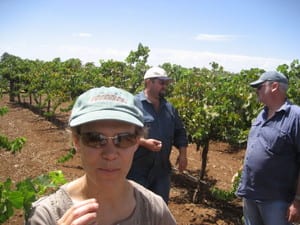 They are nice to me, for the most part, let me ask questions and take photos of old wagons. But when a grower shows up during a vineyard exploration, I feel very humble and slightly guilty, like going to a stranger’s funeral. There is a tight margin on making money growing grapes these days, and the growers were there to protect their families and, ultimately, their own survival.
They are nice to me, for the most part, let me ask questions and take photos of old wagons. But when a grower shows up during a vineyard exploration, I feel very humble and slightly guilty, like going to a stranger’s funeral. There is a tight margin on making money growing grapes these days, and the growers were there to protect their families and, ultimately, their own survival. 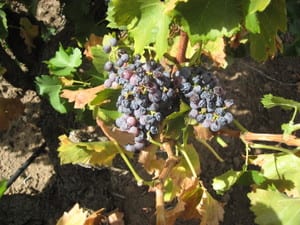
The vineyards up here, about an hour north of Adelaide are very well kept and neat. Rows are clean and plowed, and the canopies on the vines, many close to a 100 years old, flop over neatly like the wings of an egret to shield the fruit from the relentless, direct heat of the day. More so than McLaren Vale, the soil looked healthier, fluffier, and the vines in totality looked better tended to, almost obsessively so. In fact, they look like gardens. It must be that Germanic heritage, the need for order, coming through. 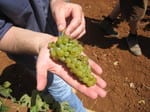

We did finish the long, hot afternoon in a beer garden in Stockwell. For some reason, however, the beer was Belgian.

